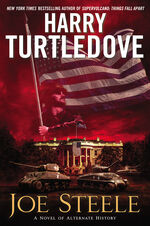
The Atlantic Charter was a pivotal policy statement issued on 14 August 1941 that, early in World War II, defined the Allied goals for the post-war world. It was drafted by the leaders of the United Kingdom and the United States, and later agreed to by all the Allied Forces of World War II. The Charter stated the ideal goals of the war: no territorial aggrandizement; no territorial changes made against the wishes of the people; self-determination; restoration of self-government to those deprived of it; reduction of trade restrictions; global cooperation to secure better economic and social conditions for all; freedom from fear and want; freedom of the seas; and abandonment of the use of force, as well as disarmament of aggressor nations. In the Declaration by United Nations of 1 January 1942, the Allies pledged adherence to this charter's principles.
The Atlantic Charter set goals for the post-war world and inspired many of the international agreements that shaped the world thereafter. The General Agreement on Tariffs and Trade (GATT), the post-war independence of European colonies, and much more are derived from the Atlantic Charter.
The Atlantic Charter was drafted by British Prime Minister Winston Churchill and U.S. President Franklin D. Roosevelt at the Atlantic Conference (codenamed Riviera) in Placentia Bay, Newfoundland. It was issued as a joint declaration on 14 August 1941. The United States did not officially enter the War until December 1941. The policy was issued as a statement; as such there was no formal, legal document entitled "The Atlantic Charter". It detailed the goals and aims of the Allied powers concerning the war and the post-war world.
Atlantic Charter in Joe Steele[]
A little more that a month after Germany invaded the Soviet Union, British Prime Minister Winston Churchill secretly met with U.S. President Joe Steele. Churchill had originally wanted Steele to come up to Canada or Newfoundland to meet but Steele insisted that as the one seeking favors, he needed to come to the USA. Therefore, Churchill flew to Newfoundland and then sailed south on a Royal Navy destroyer to offshore Portland, Maine. Steele took a train up to Portland and then sailed on a US Navy destroyer to meet him.
The purpose of the meeting was to persuade Steele to supply arms to the Soviet Union in the same manner they were supplying Britain. At first Steele refused but after meeting with his aides, he relented. Most of his aides were against it, with Vince Scriabin summarizing it as "Trotsky has made his bed, he can now sleep in it." However, Charlie Sullivan supported the idea, suggesting that if Hitler defeated the Soviets, then he would be free to defeat the British and then go after the US.[1]
References[]
- ↑ Joe Steele, pg. 237-242, HC.
| |||||||||||||||||||
